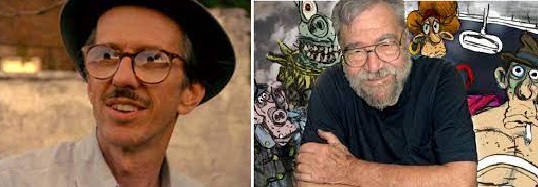
1972’s Fritz The Cat, the movie, was a seminal cultural moment, the first X-rated cartoon, an adaptation of a notorious counterculture brought to the big screen and grossing nearly 100 million worldwide, remaining the most successful independent animated feature of all time.
Yet all were not pleased with this pornographic pussy’s cinematic outing. Robert Crumb, creator of the character, hated Ralph Bakshi’s movie and was not afraid to say it. Amongst his complaints were the sexual content, which was perverse, but not Crumb’s shade of perverse.
“It’s weird: it’s really a reflection of Ralph Bakshi’s confusion, you know. There’s something real repressed about it. In a way, it’s more twisted than my stuff. It’s really twisted in some kind of weird, unfunny way. … It’s compulsive or something…like that sex attitude in it very much. It’s like real repressed horniness; he’s kind of letting it out compulsively.”
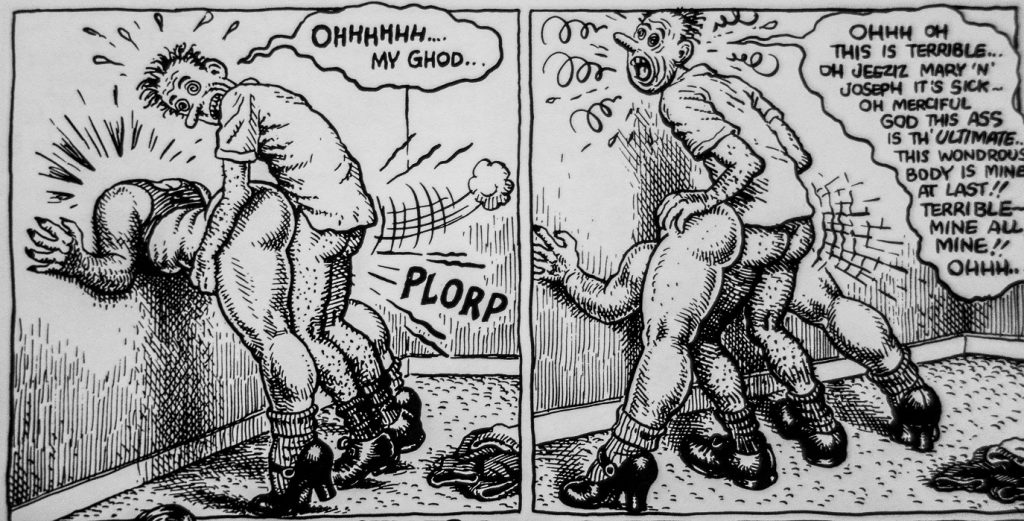
More strikingly, Crumb takes issue with the film’s climax, where wayward Fritz finally matures and makes a moral decision. After falling in with some violent revolutionaries with a perchance for swastikas and gang rape (keep that in mind when Crumb implicitly takes their side), Fritz ultimately refuses to participate in their terrorism, and denounces them with the following speech.
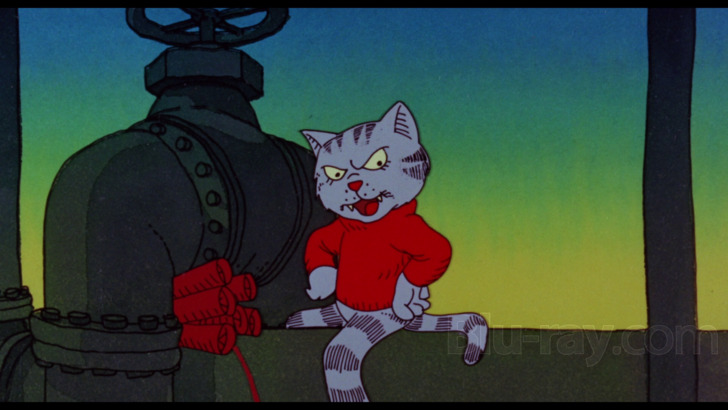
This speech, eschewing violence for love and closing with a quote from The Beatles, is what Crumb took most issue with, calling it “red-neck and fascistic” and insisting Bakshi was putting words into the kitty cat’s mouth he would never write.
Well, who was right? Why such a clash? On paper, Bakshi the animator would seem like a perfect match for Crumb’s oversexed comics. What went wrong?
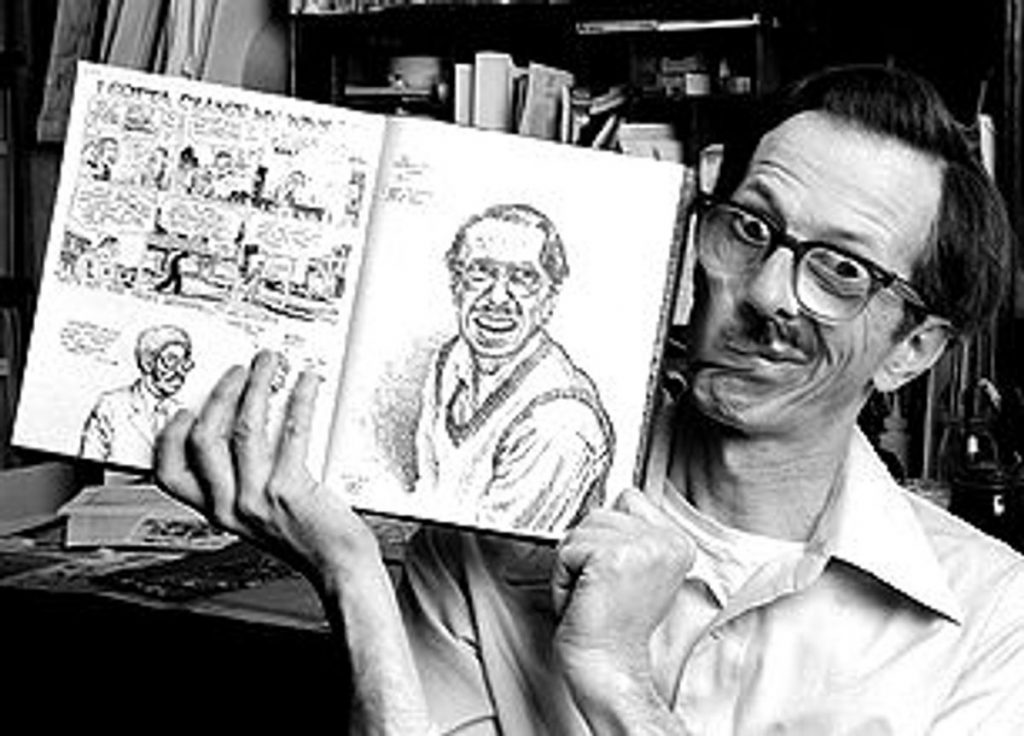
Perhaps we can glean some sense of their cultural sensibilities from their backgrounds. Crumb, a lapsed middle-America Catholic and proto-hipster- note his trademark fedora and informed but insubstantial affinity for old jazz records (not unlike Seymour in Crumb fosterling Clowes’s Ghost World, these old white men seem more interested in the medium than the music) – never seemed comfortable in his own skin or with his own crowd. He embraces counterculture but eschews hippie affiliation, and when he becomes part of the establishment- not because he’s become more conservative but because society has shifted – he’s in trouble. His rejection of Bakshi’s masterpiece adaptation is really just the same sour grapes that led to his resentment of “Keep on Trucking”, the delightfully meaningless bromide that would become the bane of his existence. This is the real fraud of Crumb and why film Fritz’s speech about real revolution pushed his buttons and exposed his immaturity- he’s not a revolutionary, because that would imply at least the hope of social success and acceptance. He doesn’t want the revolution to succeed. He just wants to be a weirdo.
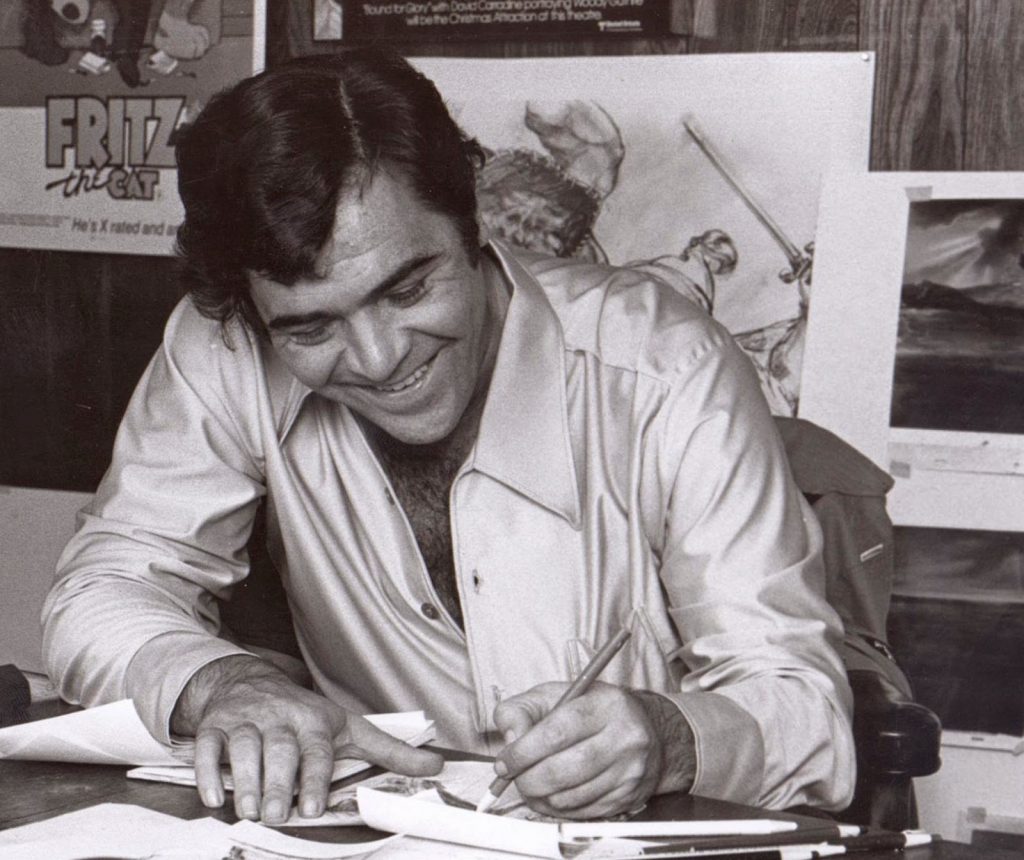
Ralph Bakshi was born in the British Mandate of Palestine before his family moved to a predominately black Brooklyn neighborhood, which he claims grew his sensitivity to African American issues and certainly contributed to the autobiographical Heavy Traffic. He grew up loving cartoons and eventually made his own. He casts a wide cultural scope, from Looney Tunes to sword and sorcery. He’s been married to the same woman for over fifty years. In person, he is affable and engaging. Whereas a key scene of Terry Zwiggof’s documentary has Robert Crumb rejecting a fan’s request for an autograph, Mr. Bakshi is approachable and generous with attention, even if we run into him coming out of the restroom. In response to Crumb’s complaints about his adaptation:
“He goes in so many directions that he’s hard to pin down. I spoke to him on the phone. We both had the same deal, five percent. They finally sent Crumb the money and not me. Crumb always gets what he wants, including that château of his in France… I have no respect for Crumb. Is he a good artist? Yes, if you want to do the same thing over and over. He should have been my best friend for what I did with Fritz the Cat. I drew a good picture, and we both made out fine.”
If it came down to it, and maybe it does, whose side would you fall on? I think I’d firmly be in the #TeamBakshi camp myself. Robert Crumb is talented, but gross. Ralph Bakshi is also talented and gross (to a lesser extent. Bakshi is gross in that it’s gross to see cartoon animals screwing, but there’s no real depravity like there is with Crumb) but I find Crumb to be pretentious, whiny and overrated on top of it. And Bakshi has versatility! Range! The critique of Crumb as an artist who does the same thing over and over again (decades of tired self-reflective masturbatory doodles and unsophisticated social commentary!) is apt, and this is coming from a man as comfortable in an oversexed animalized New York City as he is in his own private Middle Earth. His valiant quest for the Ring may not have hit the spot right on, but his own thing, taking what he likes from Tolkien onto a post-apocalyptic landscape with an allegory for the Holocaust and an exploration of the dichotomy of nature and technology? Brilliant. And if American Pop was live action, you can bet it would be rightly recognized as a multi-generational dramatic epic right up there with anything Altman, Forman, or Cimino did. Arguably they’re both dirty old men (or dirty young men, back in the day), but I get the feeling Bakshi is aware and insightful of his peccadilloes, whatever we may project them to be. Cool World, especially his original idea (wherein an animator fathered a half-cartoon lust child who sought revenge), was all about the consequences of sexualizing doodles! How’s that for meta-self-deconstruction? Whereas Crumb is cheerful and obtuse about his fetishes. I never met R. Crumb, but I did meet Bakshi, and found him to be a warm, wise, and verbose fellow.
And how much can Crumb get away with in the craven veneer of irony? He insists that a character like “Angelfood McSpade” is done to mock or subvert the racist stereotypes he did not create, but he indulges them without commentary or conscience. This is a jive-talkin’ simplistic African woman, evoking the exploitation of Sarah Baartman, who only exists to be perved on, exploited, and molested by white men. What’s the justification for this? To some degree, Crumb’s “ironic” black sambos and the like are almost actually worse than the original racist cartoonists who found these kinds of caricatures funny on the ignorant level they are, because Crumb chuckles with an unearned sense of superiority, insisting he’s laughing at the racists, exposing the racism- by indulging it. It’s a reprehensible pretense, having his angelfood and eating it too. And when an unironic white supremacist rag reprinted without permission “When the Niggers Take Over America!” and “When the Goddamn Jews Take Over America!”, Crumb insists the neo-nazis didn’t have the proper post-modern appreciation of his work:
“I just had to expose all the myths people have of blacks and Jews in the rawest way possible to tilt the scale toward truth.”
Who’s convinced? I don’t think Crumb is really a racist in the sense he thinks other races are inferior or is actively fully of hate, just that he’s too immature and insulated to understand how offensive and useless this garbage is, and what damage it can do, ironic or not. I do think he genuinely is a pervert and that his art reflects a authentic derangement that may result in real life predatory behavior, but more on that below.
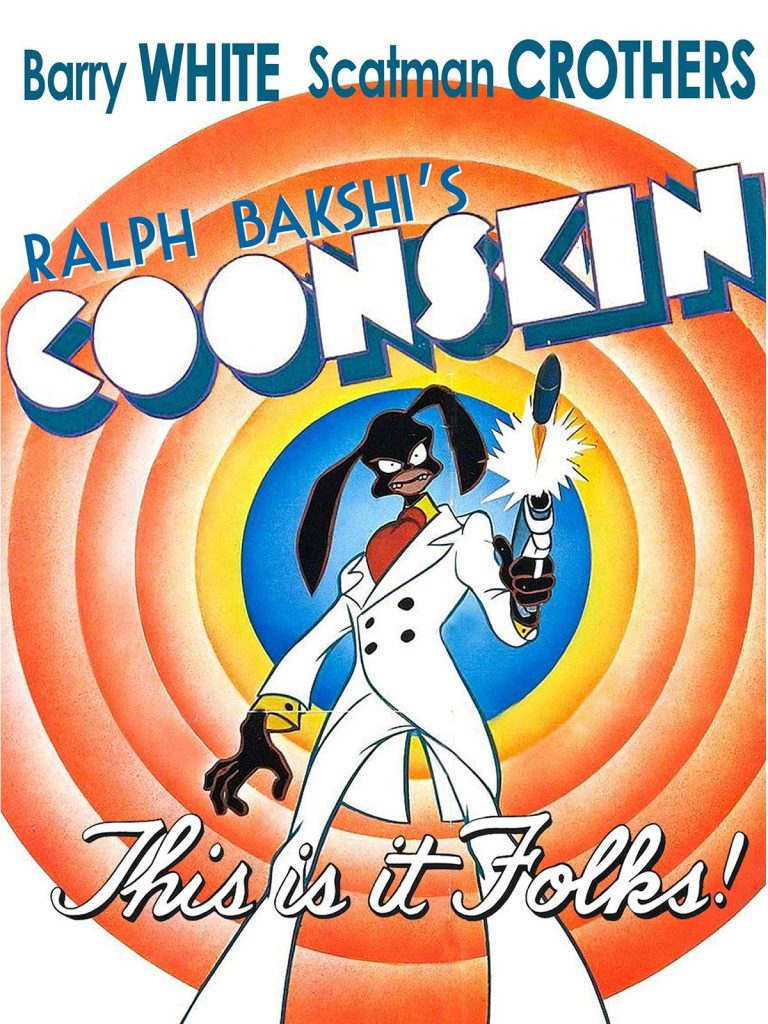
Well, what about Coonskin? That’s a fair retort. Is Bakshi just as guilty on his own? Look at those caricatures! And there’s an epithet right in the title! Yet Coonskin is clearly a celebration of American Black culture, traditional Brer Rabbit stories made all the more provocative by updating the setting to contemporary Harlem and infusing social themes very relevant to the day. When African American icons like Philip Michael Thomas, Barry White, and Scatman Crothers are active participants in an adaptation that emboldens and updates black cultural legacies, it’s a far cry from Crumb snickering over a African caricature getting molested.
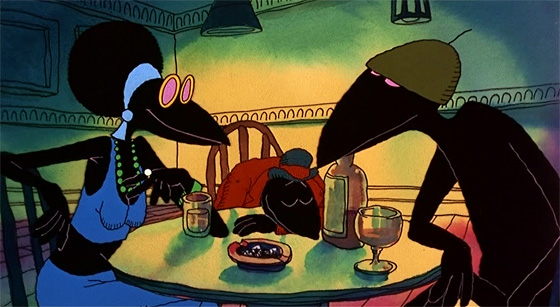
Crumb’s racist caricatures are not as enlightened as his apologists might pretend, but in adaptation, Bakshi injects more humanism and compassion, even when they’re animals. There is a refreshing naturalism in the background character dialogue of Fritz the film no one ever comments on. Right from the beginning, where the pig construction worker on a lunch break bemoans to his co-worker about shifting social mores to the black crow reminiscing about comparing his lunch with the white kids he went to school with, there is an everydayness, a verisimilitude that Crumb’s ceaseless bufoonery lacks.
Like I said, they’re both pervs. But whereas Bakshi has the simple and relatively harmless cheesecake voluptuary and at least attempted to make a film about the consequences of unfettered concupiscence, Crumb revels in the grotesque and blatantly misogynistic. They both objectify women to some degree, but while Bakshi’s Franzettaesque vixens are empowered in films like Wizards and Fire and Ice, Crumb’s headless women are something from a serial killer’s basement.
And how about the possibility that Crumb is not only a pervert of the pen, but a real life sex pest?
Consider this blog’s arguments:
https://amazingcavalieri.blogspot.com/2017/01/r-crumb-is-sexual-predator.html
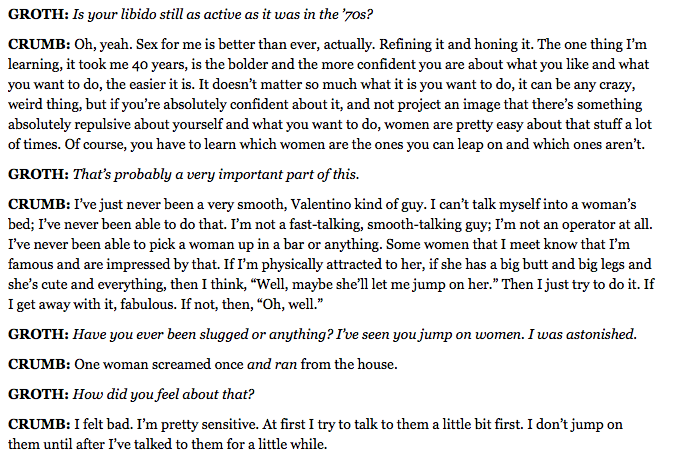
In Zwigoff’s documentary, one of Crumb’s ex’s opens up about their idiosyncratic sex life:
“You know, Robert’s not too oriented towards, uh, normal sex…so there wasn’t much in the way
of normal sex in our relationship. But lots of piggyback rides and, uh, wrestling around…and he liked to sit on my shoe a lot.”
This is relevant not for condemning Crumb’s private (well…) consensual peccadilloes, , but to illustrate that the activities he forces on women and claims to be playful (as if that makes a difference) are actually sexual to him as well.
Are we supposed to chuckle at Crumb jumping on women’s backs for a forced piggy back ride because it’s more quirky and cartoonish an assault than grabbing her breasts? Or how about that scene in Crumb when Robert is amused at his brother Maxon reminiscing about following a woman and pulling her pants down?
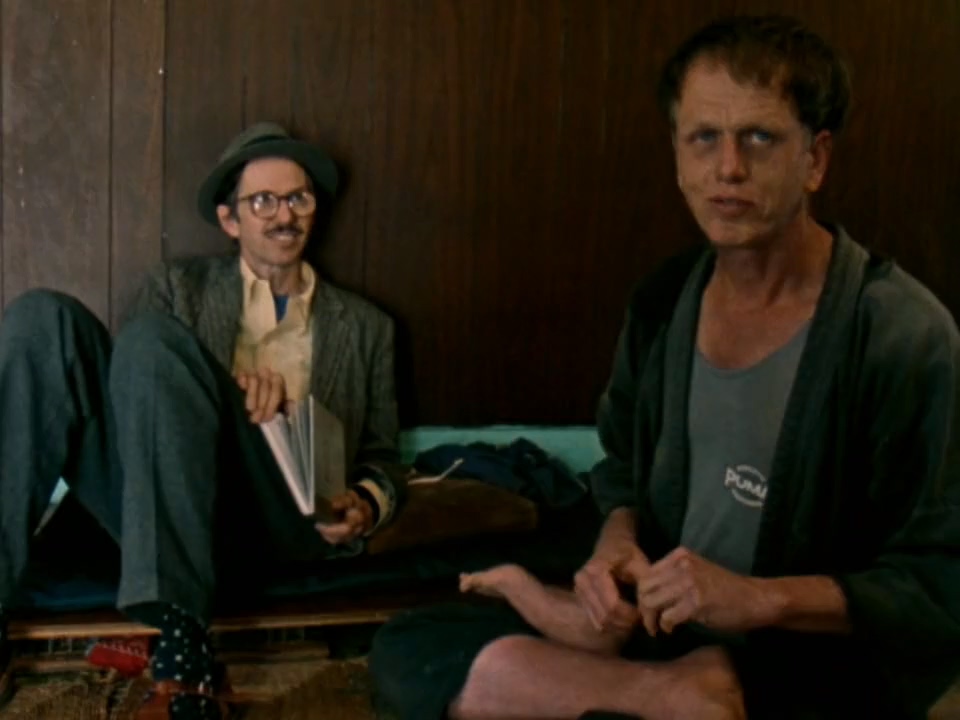
That Maxon never “got to rape” and Crumb’s own physical harassment being so bizarre and childish as an excuse is the same kind of feckless, indulgent solipsism he uses to let himself off from the charges of racism.
But to wrap up…
R. Crumb has Alan Moore Syndrome. Talented and undeniably influential, but also a bitter misanthrope who hates his own work, his legacy, and his fans. His satire can be funny and incisive, but it’s also bitter, superficial, and unproductive. Sure he’s self-deprecating, but it’s in a sort of masturbatory way (literally), without catharsis or self-improvement. Ralph Bakshi, I think, is not misanthrope. I feel like he digs the inexhaustible variety of the human experience and expresses in an ouevre that spans from autobiography to straight up Tolkien. Modern day Brer Rabbit to a rock odyssey that epically paints the American portrait. He embraces his own heritage while opening himself to an incredible range of art and fantasy. That’s why Wizards is his magnum opus. What it really comes down to, is that Bakshi’s love trumps Crumb’s hate. If Crumb thinks the Jew who made a stirring Holocaust parable on par with Spiegelman’s Maus is a fascist “redneck”, that’s sad. And Bakshi, God Bless you, and keep on truckin’.
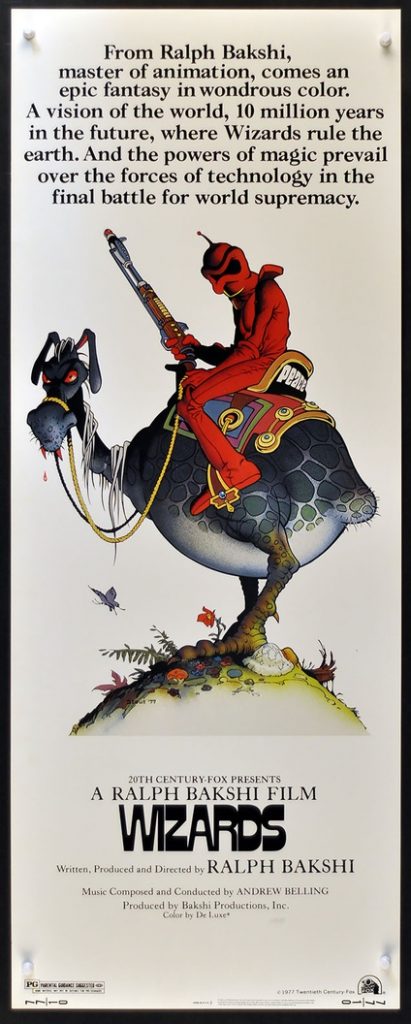
This blog post was brilliant.
Personally I HATE (not a strong enough word) Crumb and his work. It irritates me to no end how I’m met with the assumption Im easily offended by edgy things or can’t take a joke. Thank you for giving me words to express my deep and utter disdain for the infantile, shallow, and self-indulgent work of one of Americas worst ‘artists.’
Bakshi’s deviations from the source material really highlight the stark differences between the two. The way you described Crumb as narrow-minded and uninterested in anything outside of himself, in contrast to how Bakshi “paints the American portrait” was beautifully stated.
I would love to read your analysis of Bakshi’s films separately. Looking forward to reading more of your thoughts.
Thank you! I intent to get back to blogging after a long sabbatical!